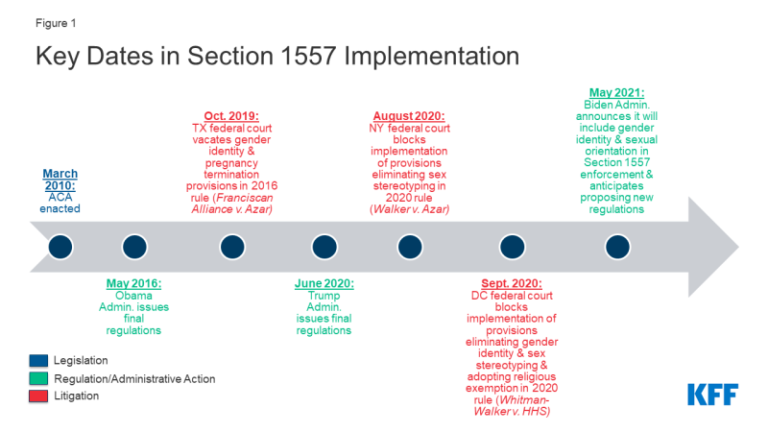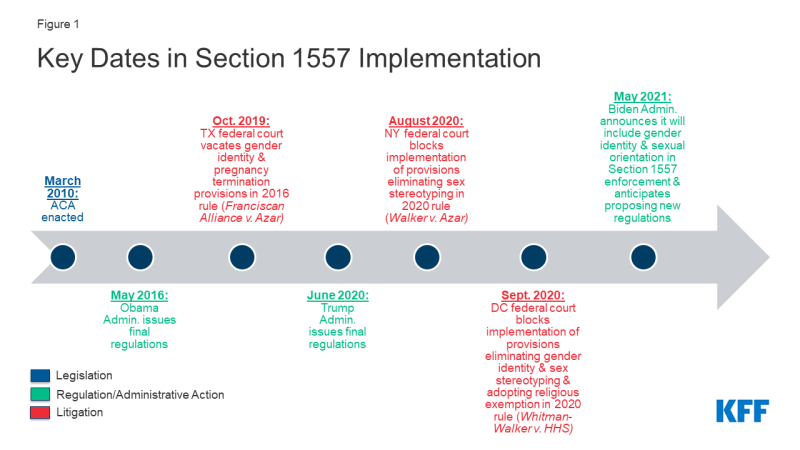
The Biden Administration has started taking steps to reverse Trump Administration policy and regulations that significantly narrowed the implementation and administrative enforcement of Section 1557, the Affordable Care Act’s nondiscrimination provision, particularly as the regulations apply to gender identity and sexual orientation. In addition, several lawsuits challenging the regulations, which were initially issued by the Obama Administration and later substantially revised by the Trump Administration, are pending. Section 1557 prohibits discrimination based on race, color, national origin, sex, age, and disability in health programs and activities receiving federal financial assistance. The two versions of the regulations, those from the Obama Administration followed by those from the Trump Administration, adopted conflicting interpretations about the content and scope of prohibited discrimination. This issue brief provides an update on current developments and identifies issues to watch in the coming weeks and months.
Administrative Actions
On May 10, 2021, the Biden Administration announced that the HHS Office for Civil Rights (OCR) will include gender identity and sexual orientation as it interprets and enforces Section 1557’s prohibition against sex discrimination (Figure 1). This announcement followed a federal agency review of existing regulations and policy directed by President Biden’s executive order on preventing and combatting discrimination based on gender identity and sexual orientation, which he issued on his first day in office. The May 2021 announcement marks both a reversal of Trump Administration policy and an expansion of Obama Administration policy. While the Obama Administration regulations included gender identity and sex stereotyping in the definition of sex discrimination, they omitted sexual orientation, noting that federal law in this area was still evolving at that time. Subsequently, the Trump Administration eliminated gender identity and sex stereotyping from the regulations. However, just after the Trump Administration regulations were published, the Supreme Court, in Bostock v. Clayton County, Georgia, ruled that sex discrimination in the employment context does include discrimination based on gender identity or sexual orientation. Following the Bostock ruling, two federal district courts issued nationwide preliminary injunctions (Figure 1 and described further below), blocking implementation of several provisions of the Trump Administration’s regulations related to Section 1557.
HHS recently indicated that it will issue a new notice of proposed rule-making (NPRM) to revise the Section 1557 regulations. The Biden Administration states that its “anticipated rulemaking proceeding will provide for the reconsideration of many or all of the changes to existing Section 1557 regulations” that are being challenged in current litigation (described below). The timeframe for the new NPRM is uncertain, with HHS stating that it intends to do so “as expeditiously as reasonably possible” while “account[ing] for HHS’s limited resources. . . .” In light of the Biden Administration’s May 10 announcement, it is likely that the new NPRM will propose not only restoring gender identity but also adding sexual orientation to the regulatory definition of sex discrimination, thereby expanding on the Obama Administration interpretation. The extent to which the new NPRM proposes restoring or expanding other Section 1557 provisions that were changed by the Trump Administration unrelated to the definition of sex discrimination, such as those related to discrimination in health insurance benefit design; language access; notices, grievance procedures, and enforcement; and covered entities, remains to be seen. The new NPRM also could propose restoring provisions prohibiting discrimination based on gender identity and sexual orientation that were eliminated by the Trump Administration in other federal health care regulations outside of Section 1557 that apply to Medicaid, the ACA Marketplaces, and private insurance issuers.
Court Actions
Three of the five cases challenging the Trump Administration regulations have been put on hold to provide the Biden Administration with additional time to complete its review of existing regulations and policy (Table 1). Courts in two of the cases on hold issued the nationwide preliminary injunction orders that continue to block implementation of some provisions of the Trump Administration regulations. These orders remain in place, although the federal government appealed both of them. A third case challenging the Trump Administration regulations also has been put on hold, though the parties disagree about how long the delay in that case should last. The cases currently on hold include:
- A DC case, Whitman-Walker Clinic v. HHS, brought by health care and social service providers who serve LGBTQ people and people with limited English proficiency (LEP). The district court’s nationwide preliminary injunction prevents the federal government from implementing provisions of the Trump Administration regulations that (1) exclude sex stereotyping from definition of sex discrimination and (2) incorporate a blanket religious freedom exemption from claims of sex discrimination. The next status report is due to the court on August 12, 2021.
- A New York case, Asapansa-Johnson Walker v. Azar, brought by two transgender women of color. The district court’s nationwide preliminary injunction prevents the federal government from implementing provisions of the Trump Administration regulations that exclude gender identity and sex stereotyping from definition of sex discrimination, require healthcare providers to treat individuals consistent with their gender identity, and prohibit providers from denying or limiting services based on gender identity. The next status report is due to the court on August 12, 2021.
- Another New York case, NY v. HHS, brought by a group of 23 states. Both sides have agreed to put the case on hold but disagree about when the next status report should be due to the court. The states propose June 13, 2021, while the federal government proposes August 12, 2021.
Two other cases challenging the Trump Administration regulations are currently active (Table 1). Decisions in these cases could influence the contents of the Biden Administration’s expected NPRM as well as the status of the Trump regulations that remain in effect. The active cases include:
Another two cases, which were filed to challenge the Obama Administration regulations and are still pending, raise issues about the interaction between Section 1557’s nondiscrimination provisions and federal laws that protect religious beliefs. The Supreme Court did not reach this issue in Bostock, noting that this is a question for future cases to decide. These cases include:
- Religious Sisters of Mercy v. Becerra, in which the Biden Administration is appealing a North Dakota federal court ruling that blocks it from requiring Catholic health care entities to perform or provide health insurance coverage for gender transition services under the Obama Administration’s Section 1557 regulations.
- Franciscan Alliance v. Becerra, in which religiously affiliated health care providers claim that the Obama Administration regulations’ inclusion of gender identity and termination of pregnancy in the definition of sex discrimination would require them to serve people seeking transgender care and people who have terminated a pregnancy in violation of the providers’ religious rights. The 5th Circuit Court of Appeals sent the case back to the trial court to determine whether the providers’ claims are moot in light of the subsequent Trump Administration regulations as well as the recent Biden Administration actions. Briefing on these issues closes on June 18, 2021.
Looking Ahead
The interpretation and enforcement of Section 1557’s prohibition against discrimination in federally funded health programs and activities will continue to develop in the coming months. Outside of the Section 1557 regulations and surrounding litigation, federal courts in other cases have granted relief to individuals alleging discrimination under Section 1557, relying on the text of the statute itself. For example, a Wisconsin federal court permanently blocked the state Medicaid program’s categorical exclusion of gender affirming services from coverage as a violation of the statutory prohibition against sex discrimination. Future court rulings, the forthcoming NPRM, and administrative enforcement by OCR under the new Biden Administration policy together will influence Section 1557 law and policy and could affect the ability to access health coverage and care without discrimination.
| Case Name/Court | Plaintiffs | Status |
| Whitman-Walker Clinic v. HHS
(DC district court and DC Circuit Court of Appeals.) |
Health care and social service providers who serve LGBTQ people and people with LEP | Case is on hold, with next status report due 8/12/21, to provide Biden Administration time to assess next steps. Nationwide preliminary injunction blocking parts of Trump Administration rule remains in place.
|
| Asapansa-Johnson Walker v. Azar
(NY district court (eastern district) and 2nd Circuit Court of Appeals) |
2 transgender women of color | Case is on hold, with next status report duel 8/12/21, to provide Biden Administration time to assess next steps. Nationwide preliminary injunction blocking certain provisions of Trump Administration rule remains in place.
|
| NY v. HHS
(NY district court (southern district)) |
23 states (NY, CA, MA, CO, CT, DE, DC, HI, IL, ME, MD, MI, MN, NV, NJ, NM, NC, OR, PA, RI, VT, VA, WI) | Case is on hold, although the parties disagree about when the next status report should be due. The states propose 6/13/21, while the federal government proposes 8/12/21.
|
| Boston Alliance of Gay, Lesbian, Bisexual & Transgender Youth v. HHS
(Massachusetts district court) |
A transgender man and health care and social service providers who serve LGBTQ people and people with LEP | Case is active. Hearing scheduled for 6/3/21 on federal government’s motion to dismiss the lawsuit.
The court denied federal government’s motion to stay the case. The federal government had asked for the case to be put on hold to give HHS time to complete its review of regulations and policy in light of the Biden Administration’s executive order directing federal agencies to review existing regulations and policy to prevent and combat discrimination based on gender identity and sexual orientation and to allow the Biden Administration time to review the issues in the lawsuit. The plaintiffs opposed the request. |
| Chinatown Service Center v. HHS
(DC district court) |
Community-based organizations serving older adults with LEP | Case is active. Awaiting federal government’s response to complaint. |
| SOURCE: KFF analysis of case documents, available at https://affordablecareactlitigation.com/aca-enforcement-directly-and-1557/. | ||
